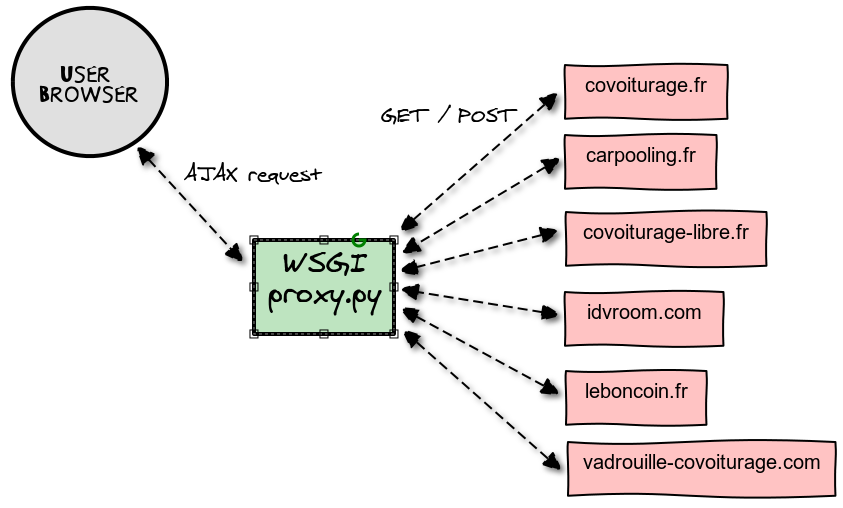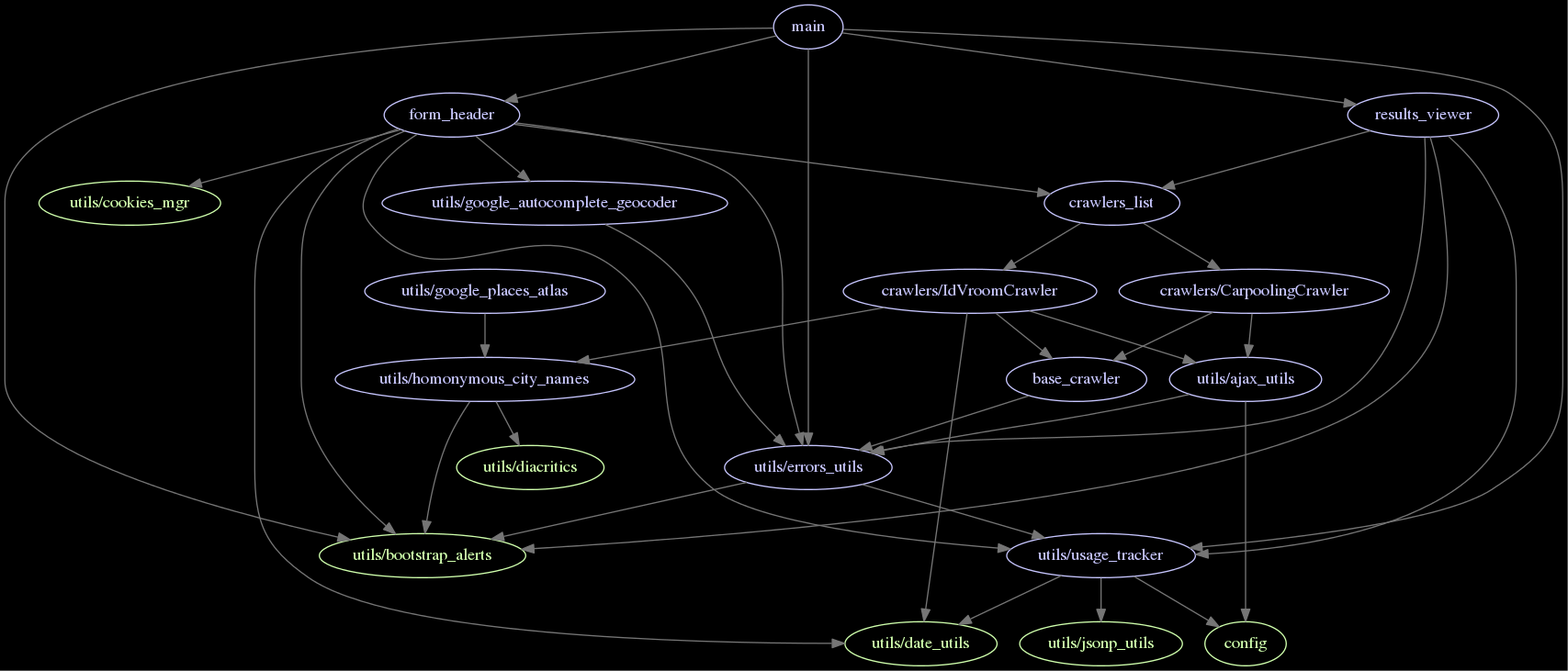A web search engine for French carpooling ads.
- Python Requests : for the WSGI proxy script
- Lo-Dash : a functional programming Javascript utility library
- Twitter Bootstrap : front-end framework for HTML & CSS
- Bootstrap-datepicker & Bootstrap-table : 2 plugins requiring jQuery
- Google Maps Places : for its autocomplete functionality
- SugarJS : for its date parsing module. The file sugar-1.4.1_date_locale-fr.min.js is the 'dev' minimal version of SugarJS Date module + the French locale customized build, minimized using the Clojure compiler.
make, browserify, david, madge, piprot, uwsgi
jshint, pylint, jscs, pep8, bootlint, Nu Markup Checker (v.Nu)
tape, pytest, WebTest
Once the user has specified the search parameters, AJAX requests are made to the carpooling websites, and the responses are parsed in Javascript to extract the rides information. Because of the Same-origin policy, those AJAX requests are proxied, but all the parsing logic is still done on the client side.
They are following the Node.js convention and are bundled by browserify.
The following diagram represents their dependencies, except a couple of very common base modules, with only 2 crawlers included. It can been generated by invoking make deps-graph.
Beware that this does not reveal all the modules ties. E.g. form_header.js is passed the results_viewer.js module and invokes some of its methods but don't include it directly.
A crawler is a Javascript module, living in the crawlers/ source directory, dedicated to scrape a single carpooling website. It must respect its robotos.txt.
The crawlers modules share a common API, i.e. a list of properties:
.DISPLAY_NAME[mandatory].TAG_NAME[mandatory].WEBSITE_URL[mandatory].NEED_LAT_LNG[default:false].HIDDEN_COLUMNS[default:[]].SORT_NAME[default:'departure_hour'].SORT_ORDER[default:'asc']
Moreover, each crawler must have a .CALLBACKS_PIPELINE array property, consisting of an ordered list of callback functions:
* each function must accept a cb_chain as first argument
* each callback execution must end with a call to cb_chain.next(_args, _for, _next, _callback)
* the first callback is passed a user_input dictionary object as first argument, and then a lat_lng object if it defines NEED_LAT_LNG
* the last callback must invoke cb_chain.next with 3 arguments: (crawler, rides, query_params)
Finally, each crawler must define a .remote_search_links(query_params) function returning either a single string or a dictionary {link_name: link_href}).
Rides on this website are registered by users in a very chaotic free-form way. There are 2 methods to get results: queries based on a {searchtext} and queries base on a {location}. The crawler gather rides from both methods.
By default, LeBonBoin.fr search results do not include the ride date, only the ad publication date. Rarely, the author will include the ride date in its ad short description. Similarly, the information on the ride price & driver are often only displayed on the ad page itself.
Because so much structured information is missing, we use the following algorithm to filter out parasite results:
- if a ride date can be extract, discard the ad in the search results if it contains none of the departure / arrival cities in its description
- if no ride date can be extracted, discard any ad that do not contain both the departure & arrival cities
You will need npm and pip to install the needed libraries and tools.
Under Cygwin, you'll also need to apt-cyg install libcrypt-devel beforehand.
Then, simply invoke make install to install everything from the requirements.txt and package.json files.
Once the server is configured with mod_wsgi, just add the following line to its configuration. Assuming you've allowed Apache to serve the other static files in the project directory, it should just work.
WSGIScriptAlias /ecovoit/proxy /var/www/ecovoit/proxy.py
location /ecovoit/proxy {
include uwsgi_params;
uwsgi_pass wsgi_proxy;
proxy_redirect off;
proxy_set_header Host $host;
proxy_set_header X-Real-IP $remote_addr;
proxy_set_header X-Forwarded-For $proxy_add_x_forwarded_for;
proxy_set_header X-Forwarded-Host $server_name;
}
uwsgi --socket :8080 --daemonize uwsgi.log --static-map /=. --mount /ecovoit/proxy=proxy.py --manage-script-name
pew new ecovoit -p python2
make install
cat << EOF | sudo tee /etc/init/ecovoit.conf
start on startup
script
set -o errexit -o nounset -o xtrace
cd $PWD
exec >> upstart-stdout.log
exec 2>> upstart-stderr.log
date
HOME=$HOME pew in ecovoit uwsgi --socket :8080 --static-map /=. --mount /ecovoit/proxy=proxy.py --manage-script-name
end script
EOF
service ecovoit start
make check # => check-static check-style check-html
make test-proxy # execute the unit tests for the Python proxy
make run-testling-tests # generate the Javascript unit tests, and open testling-tests.html in a browser to execute them
To execute Javascript tests selectively, you can pass a regular expression as query string to testling-tests.html, e.g. :
http://localhost:8080/index-tests.html?full-blackbox-test
Note: currently unit tests include integration tests, that is tests requiring an Internet connexion and effectively querying websites.
This project uses SauceLabs to run the tests in several browser at once on every push:
To run the Selenium tests manually, you'll have to launch a selenium server and invoke py.test :
wget selenium-release.storage.googleapis.com/2.44/selenium-server-standalone-2.44.0.jar
java -jar selenium-server*.jar
make start-local-server
py.test -sv --pdb tests/saucelabs_selenium_test.py --website http://localhost:8080 --browser=chrome
To run only the chrome test remotely on SauceLabs:
py.test -sv tests/saucelabs_selenium_test.py::EcovoitTest_chrome
The SauceLabs credentials are stored in a JSON file named .saucelabs_auth.json.
To load them in a shell, you can use the wonderful jq :
source <(jq -r 'to_entries|.[]|"export SAUCE_\(.key|ascii_upcase)=\(.value)"' .saucelabs_auth.json )
# defines SAUCE_USERNAME and SAUCE_ACCESS_KEY from .saucelabs_auth.json
Credit goes to the amazing Laetitia Beschus for the artwork.
Creative Commons Attribution NonCommercial (CC-BY-NC)
Tl;dr plain English version: https://tldrlegal.com/license/creative-commons-attribution-noncommercial-(cc-nc)

